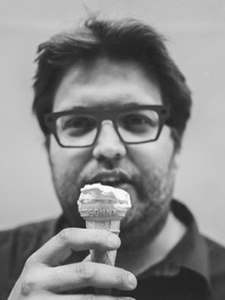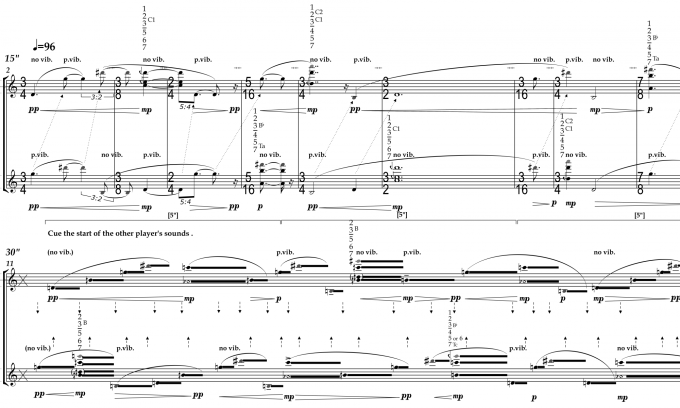Dr Larry Goves
Dr Larry Goves is Director of The Experimental/Exploratory Music Research Centre (EEMRC) at the RNCM.
 A British composer based in Manchester, UK, his music has been performed and broadcast around the world by groups and musicians including The London Symphony Orchestra, The London Sinfonietta, The Nash Ensemble, The BBC Philharmonic, The National Youth Orchestra of Great Britain, The Britten Sinfonia, Psappha, Ixion, The Hallé, EXAUDI, 175 East (New Zealand), L’Instant Donné (France), 175 East (Norway), the Divertimento Ensemble (Italy), Sarah Nicolls, Oliver Coates and Tom McKinney. His music has been released on LSO Live, NMC, Dutton, Prima Facie, Slip, Nonclassical, Prah and on The London Sinfonietta’s Label.
A British composer based in Manchester, UK, his music has been performed and broadcast around the world by groups and musicians including The London Symphony Orchestra, The London Sinfonietta, The Nash Ensemble, The BBC Philharmonic, The National Youth Orchestra of Great Britain, The Britten Sinfonia, Psappha, Ixion, The Hallé, EXAUDI, 175 East (New Zealand), L’Instant Donné (France), 175 East (Norway), the Divertimento Ensemble (Italy), Sarah Nicolls, Oliver Coates and Tom McKinney. His music has been released on LSO Live, NMC, Dutton, Prima Facie, Slip, Nonclassical, Prah and on The London Sinfonietta’s Label.
He has also worked on a variety of installation projects including: an installation for the Aldeburgh Festival Technology Residency (building new instruments and writing new music in collaboration with Sound Intermedia’s David Sheppart); music for video installation with artist Aura Satz (for the Tatton Park Biennial 2012); and music for Dr Beau Lotto’s wall for 88 speakers with corresponding visuals (for the Brain Unravelled, an installation at the Wellcome Institute in 2009 and subsequently at the Science Museum London).
He directs ensemble The House of Bedlam, curates the Decontamination concert series at the Royal Northern College of Music and has co-curated their New Music North West Festival. He is a Paul Hamlyn Award for Composers recipient, has been shortlisted for an RPS Award and is a recipient of a Jerwood-Aldebrugh Opera Writing Fellowship. He is a Lecturer in Composition at the Royal Northern College of Music and a composition tutor for the National Youth Orchestra of Great Britain.
Research Projects
Multimodal performer interaction/coordination as a creative compositional parameter
This project is a exploration of and reflection on a recent body of compositional work and current work in progress that considers the possibilities of multimodal performer interaction as a primary creative compositional parameter. Multimodal embodied interaction is a feature of (almost) all music that involves more than one performer. This has been extensively explored in relation to performer interpretation and behaviour but much less as a creative or analytical musical tool.
The investigation for these compositions began with a survey of performer interactions in Olivier Messiaen’s Quatuor pour le fin du temp and historical music of my own. This has led to a number of pieces in which performer interaction/coordination contributes to the sound of the music outside of more typical interpretation/improvisation models. More recently this has included a work where the use of text as rhythmic notation in an ensemble situation has allowed aspirational coordination in performer behaviour to contribute to the surface of the music. In a work in progress (for two saxophones and electronic sounds) conventional, cued and text notations are employed more fluidly structured around a gradual transformation from less to more apparently coordinated behaviour (potentially/probably) distinct from the sonic result. This approach, in part, maps the notion of ‘collaboratively constructed utterances’ into a music performance scenario. The paper also speculates on the next stage in this compositional exploration, particularly in potentially applying Emanuel Schegloff’s concept of ‘lexical affiliate’ in addressing the correspondence between a gesture and spoken utterance for a new musical notation.
Selected Relevant Pieces
The two from Rastibon could start a Hailstorm [2018] – for two alto saxophones and electronic sound, 15 minutes
Commissioned by Anthony Brown
Two from Dr Suss [2013] – for female voice, bass flute and prepared cello and text by Matthew Welton, 12 minutes
Commissioned by Trio Atem
A glimpse of the sea in a fold of the hills [2011] – for seven instruments and electronics
Commissioned by L’Instant Donné, 12 minutes
Performances and Broadcast:

Extract from The Two From Rastibon
02/05/2018: The two from Rastibon could start a hailstorm; The House of Bedlam; CNRR, Royal Northern College of Music
17/01/2015: A glimpse of the sea in a fold of the hills; ddmmyy (Jack Sheen (cond.); BBC Radio 3 Hear and Now
16/11/2014: A glimpse of the sea in a fold of the hills; ddmmyy (Jack Sheen (cond.); The Carole Nash Recital Room, RNCM, Manchester
02/11/2013: A glimpse of the sea in a fold of the hills; Psappha (Nicholas Cox (cond.); Cosmo Rodewald Concert Hall, University of Manchester
21/04/2013: Two from Dr Suss; Trio Atem, Clothworkers Centenary Concert Hall, Leeds University
09/03/2013: Two from Dr Suss; Trio Atem; International Anthony Burgess Foundation
14/02/2013: Two from Dr Suss; Trio Atem; Cosmo Rodewald Concert Hall, Univerity of Manchester
22/03/2012: A glimpse of the sea in a fold of the hills; L’Instant Donné; Théâtre l’échangeur, Bagnolet, Paris
06/12/2012: A glimpse of the sea in a fold of the hills; L’Instant Donné; Festival Reims Scènes d’Europe, Comedie de Reims, France
Presentations:
13/12/2017: From multimodal performance interaction to projecting text: the physical, sonic and visual; The RNCM Sir John Manduell Research Forum Series
26/09/2017: Multimodal performer interaction as a creative compositional parameter; Trinity Laban Conservatoire of Music and Dance, London
09/07/2017: Multimodal performer interaction as a creative compositional parameter, 8th International Conference on Music/Sonic Art: Practices and Theories (MuSA17); Institut für Musikwissenschaft und Musikinformatik (IMWI), Karlsruhe
12/10/2016: Coordination/interaction as a composition parameter, Pathways to Composition Research Panel, The RNCM Sir John Manduell Research Forum Series
10/09/2015: Exploring the rule-based and ensemble interaction processes in ‘Two from Dr Suss’, The Royal Musical Associations Annual Conference – Music as/and process session, Birmingham
Composition with projected text
This project is attached to a sequence of pieces that explore the relationship between music the projected text. As in Yannis Kyriakides paper Hearing Words Written (‘Organised Sound’, 2016) this project explores the relationship between projected text and closely associated sound and addresses the question ‘where is the voice?’ in relation to instrumental music and projected text (particularly in Extracts from South Korea and Japan 2002 (2015)) . This approach serves to activate the audience’s ‘inner voice’ as they navigate these two medias. This has also been a continuation of my collaborative work with writer Matthew Welton as we seek to explore what it is to set text to music. In The book of Matthew, in particular, the close association of the music to text helps decode a complex set of poetic variations even when presented simultaneously.
Pieces:
The book of Matthew (2016) – for flute, alto saxophone, classical guitar, cello and film
Commissioned by The House of Bedlam
Extracts from South Korea & Japan 2002 (2015) – for oboe or flute and PowerPoint projection, text by Matthew Welton
Commissioned by the London Sinfonietta
Performances:
13/11/2017; The book of Matthew, The House of Bedlam, Carole Nash Recital Room, RNCM, Manchester
21/08/2017 – Extracts from South Korea and Japan 2002, Kathryn Williams (flute), Ohio State University, Columbus, Ohio, USA
29/03/2017; The book of Matthew, The House of Bedlam, Leggate Theatre, Victoria Gallery & Museum, University of Liverpool
05/12/2016; The book of Matthew, The House of Bedlam, Café OTO (for ddmmyy), London
05/12/2016; Extracts from South Korea & Japan 2002, Kathryn Williams (flute), Café OTO (for ddmmyy), London
19/05/2016; The book of Matthew, The House of Bedlam, Kiln Studio, Snape Maltings
17/06/2015; Extracts from South Korea & Japan 2002, Kathryn Williams (flute), International Anthony Burgess Foundation, Manchester
28/01/2015; Extracts from South Korea & Japan 2002, London Sinfonietta (Gareth Hulse, oboe), Kings Place, London
Presentations:
13/12/2017 – From multimodal performance interaction to projecting text: the physical, sonic and visual; The RNCM Sir John Manduell Research Forum Series
Other Relevant Pieces/Publications
Michael Finnissy and Wolfgang Amadeus Mozart: The composer as anthropologist. Tempo, 71(280), pp.47-55 [2016]
Abstract: Features of Michael Finnissy’s music are considered through some of the ideas and writings of anthropologist Tim Ingold. Finnissy and Ingold share a preoccupation with line and, more specifically, exploring Finnissy’s compositional approach as applied anthropology provides productive insights into his music and performance practice. The starting point for this investigation is a consideration of three of Finnissy’s pieces connected to Wolfgang Amadeus Mozart: Completion of the Requiem KV 626 by W.A. Mozart and F.X. Süssmayr (2011); Cibavit eos (1991); and WAM (1990-91). These pieces provide a convenient set of examples with relevant features: music that connects to the past; music with elaborate line(s); music written for amateur performers; transcription; and instrumentalists that move as part of the performance. These recurring features of Finnissy’s composition could be considered indicative of this anthropological approach; they are informed by an investment in people that aspires to musical and personal transformation.
Presentations of the paper:
19/01/2017; Bright Futures, Dark Pasts: Michael Finnissy at 70, City University, London
17/11/2016; Michael Finnissy: Dialogues Symposium, University of Huddersfield
The Devotions (2014)
For eleven instruments.
30 minutes
Co-commissioned by //hcmf, BIT20 and Borealis.
Performances:
13/03/0215: BIT20, Jessica Cottis (cond.), Logen Theatre, Borealis Festival, Bergen
22/11/2014: BIT20, Baldur Brönnimann (cond.), St Paul’s Hall, Huddersfield Contemporary Music Festival
Broadcasts:
08/04/2015: DR P2 Broadcast (Denmark), BIT20, Jessica Cottis (cond.), Logen Theatre, Borealis Festival, Bergen
20/03/2015: NRK Broadcast (Norway), BIT20, Jessica Cottis (cond.), Logen Theatre, Borealis Festival, Bergen
22/11/2014: Hear & Now, Live BBC Radio 3 Broadcast BIT20, Baldur Brönnimann (cond.), St Paul’s Hall, Huddersfield Contemporary Music Festival

